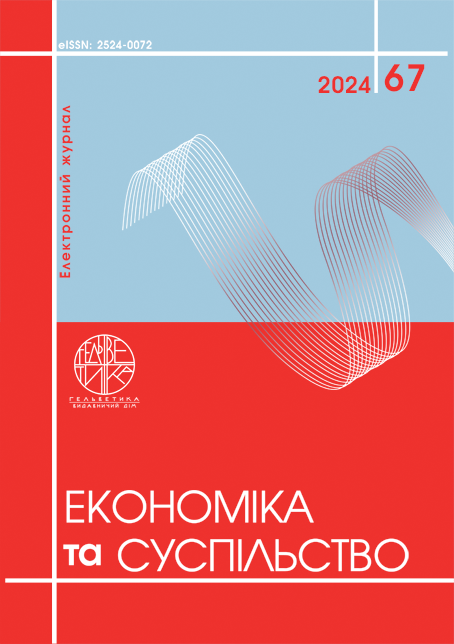DIGITAL MARKETING OF TODAY: ADVANTAGES AND DISADVANTAGES
Abstract
This article is devoted to the study of the advantages and disadvantages of digital marketing in modern business practice. The purpose of this analysis is to evaluate the main digital marketing tools, in particular search engine optimization (SEO), social media marketing (SMM), content marketing, email marketing, and their impact on the success of marketing initiatives and consumer behavior. In addition, the article discusses the main challenges that businesses face when implementing digital marketing strategies, such as concerns about data privacy, intense competition, and dependence on constant technological advancement. The study shows that the strategic use of digital tools can increase sales, improve brand perception, and attract new customers. The importance of this topic is emphasized by the rapid development of digital technologies, which have become vital components of modern marketing strategies, requiring businesses to adapt to the dynamics of new markets. The practical significance lies in the disclosure of methods for increasing the competitiveness of organizations through the use of digital marketing tools. Future research directions may include exploring the latest technologies, such as artificial intelligence, to further enhance the effectiveness of digital marketing efforts. In the article, we show that digital marketing offers unprecedented opportunities for precise interaction with the audience, ensuring personalization of communications and creating multi-channel promotion strategies. We also note that an important advantage is the ability to quickly analyze and adjust marketing campaigns in real time, which allows companies to be flexible and respond effectively to market changes. In addition, digital channels allow businesses to operate globally, breaking down geographical barriers and providing their services.
References
Окландер М.А., Окландер Т.О., Яшкіна О.І. та ін. Цифровий маркетинг – модель маркетингу ХХІ сторіччя: монографія; за ред. М.А. Окландера. Одеса : Астропринт, 2017. 292 с.
Holovchuk Y.O., Stadnyk V.V. Marketing resources and technologies for innovative potential of industrial enterprise. International Journal of Economics and Society. 2017. Vol. 2. Iss. 9. P. 39–45.
Ковальчук С., Лазебник М. Ринок маркетингових комунікацій України: огляд та тенденції розвитку. Маркетинг в Україні. 2016. №3. С. 18–33.
Gangeshwer D.K. E-Commerce or Internet Marketing: A Business Review from national context. International Journal of u- and e- Service, Science and Technology. 2015.Vol. 6. № 6. P. 187–190.
Савицька Н.Л. Маркетинг у соціальних мережах: стратегії та інструменти на ринку В2С. Маркетинг i цифрові технології. 2017. № 1. С. 20–33.
Kopalle, P.K., Gangwar, M., Kaplan, A., Ramachandran, D., Reinartz, W. & Rindfleisch, A. (2022). Examining artificial intelligence (AI) technologies in marketing via a global lens: Current trends and future research opportunities. International Journal of Research in Marketing. 39(2). 522–540. DOI: https://doi.org/10.1016/j.ijresmar.2021.11.002
Thaler, R.H. (2016). Behavioral economics: Past, present, and future. Chicago.
Rust, R.T. (2020). The future of marketing. International Journal of Research in Marketing. 37 (1). 15–26. DOI: https://doi.org/10.1016/j.ijresmar.2019.08.002
Oklander M.A., Oklander T.O., Yashkina O.I. et al. (2017). Digital marketing – model of marketing of the XXI century [Digital marketing – a model of marketing of the XXI century], monograph. Odesa: Astroprint, 292 s.
Holovchuk Y.O., Stadnyk V.V. (2017). Marketing resources and technologies for innovative potential of industrial enterprise [Marketing resources and technologies for innovative potential of industrial enterprise]. International Journal of Economics and Society, Vol. 2, Iss. 9, P. 39–45.
Kovalchuk S., Lazebnyk M. (2016). The market of marketing communications of Ukraine: review and development trends [The market of marketing communications of Ukraine: review and development trends]. Marketing in Ukraine, №3, S. 18–33.
Gangeshwer D.K. (2015). E-Commerce or Internet Marketing: A Business Review from national context [E-Commerce or Internet Marketing: A Business Review from national context]. International Journal of and Service, Science and Technology, Vol. 6, No. 6, P. 187–190.
Savytska N.L. (2017). Marketing in social networks: strategies and tools in the B2C market [Marketing in social networks: strategies and tools in the B2C market]. Marketing and digital technologies, № 1, S. 20–33.
Kopalle, P.K., Gangwar, M., Kaplan, A., Ramachandran, D., Reinartz,W. & Rindfleisch, A. (2022). Examining artificial intelligence (AI) technologies in marketing via a lobal lens: Current trends and future research opportunities. International Journal of Research in Marketing. 39(2). 522–540. DOI: https://doi.org/10.1016/j.ijresmar.2021.11.002
Thaler, R.H. (2016). Behavioral economics: Past, present, and future. Chicago.
Rust, R.T. (2020). The future of marketing. International Journal of Research in Marketing. 37 (1). 15–26. DOI: https://doi.org/10.1016/j.ijresmar.2019.08.002

This work is licensed under a Creative Commons Attribution 4.0 International License.


